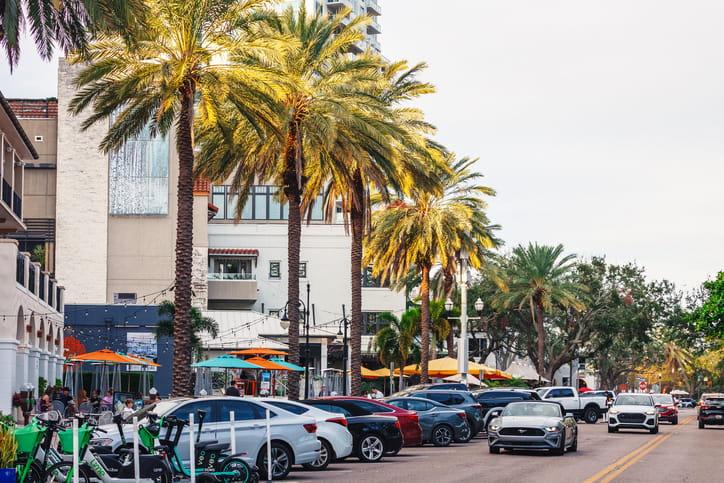Florida Driving Laws
PROTECTING YOUR RIGHTS SINCE 1983
Miami car accident attorneys at Bernstein & Maryanoff Injury Attorneys have the knowledge and experience necessary to get you maximum compensation for your car accident injuries.
Residents and tourists must obey Florida’s driving laws while driving in the state. Obeying Florida’s driving rules and regulations can help you avoid accidents; still, Florida reported 3,098 fatal motor vehicle accidents (MVAs) in 2020.

Adhering to Florida’s driving rules and regulations will help you cope with the aftermath of an accident. If you have been in an MVA in Florida, Bernstein & Maryanoff are committed to protecting accident victims’ rights and can provide the legal help you need.
Florida’s Basic Driving Rules and Regulations
Florida driving laws determine how to qualify for a driver’s license.
Those 15 or older may acquire a learner’s license by providing the following:
- Signed or notarized parental consent form (if under 18 years of age)
- Proof they have completed the Traffic Law and Substance Abuse Education (TLSAE) course
- Proof of citizenship
- Proof of social security
- Proof of residence
Individuals must also pass the following to qualify for a learner’s license:
- Class E Knowledge Exam
- Hearing test
- Vision test
Those 16 and up may qualify for a Class E driver’s license. In addition to fulfilling the requirements for a learner’s license, those seeking a driver’s license must:
- Have a learner’s license for a year or be 18
- Have no traffic violations during the year you had your learner’s license or complete a Basic Driver Improvement (BDI) course
- Log no fewer than 50 hours of driving time, including 10 hours of night driving experience
Per Florida driving rules, it is illegal to drive without carrying at least $10,000 in property damage liability (PDL) and personal injury protection (PIP) coverage.
1. Traffic Signals and Sign Rules
A green light indicates the right of way. Solid and flashing red lights indicate you must come to a complete stop. A solid or flashing yellow light indicates drivers should slow down and check to ensure it’s safe to enter the intersection.
Right of Way
Drivers approaching yield signs must be ready to stop.
The first vehicle to arrive has the right-of-way at a four-way stop. If multiple vehicles arrive simultaneously, the driver to your right has the right-of-way.
Vehicles going straight have the right-of-way. If they are facing a vehicle turning left, vehicles turning right have the right-of-way.
Road Signs
Regulatory signs convey Florida traffic laws and regulations and include:
- Florida speed limit signs
- Stop signs
- Yield signs
Warning signs identify potential hazards and include:
- Railway crossing signs
- School zone signs
Guide signs provide helpful information and include:
- Exit signs
- Road markers
- Service signs
Lane Usage and Changes
Vehicles must not change lanes unless it’s permitted and safe to do so. You can change lanes when the line separating you from oncoming traffic is dashed.
Move Over Laws
When driving in Florida, if it’s safe to do so, you must move one lane to the left when passing:
- Police cars and other emergency vehicles on the roadside
- Construction or maintenance vehicles with flashing lights
- Disabled vehicles
- Sanitization vehicles
- Tow trucks
- Utility service vehicles
2. Florida Speed Limit Laws
Drivers must comply with Florida speed limit laws. In Florida, you can go five over the speed limit without getting a ticket.
You must maintain a “reasonable and prudent” speed despite the posted speed limit. If road conditions change, you must adjust your speed accordingly.
Florida’s speed limits vary by road type and zone. Typical limits include the following:
- School zones: Drivers must not exceed 20 mph
- Municipal zones and urban streets: Drivers must not exceed 30 mph
- Other roads and highways: Drivers must not exceed 55 mph
Drivers may receive a ticket and fine for driving six or more miles per hour over the speed limit. The fine is determined by the number of mph over the speed limit. There are additional fines for speeding in specific areas, such as schools and construction zones.
3. Florida Highway Speed Limits
Florida highway speed limits are higher than the highest speed limits in urban areas of Florida. Those driving on highways with four or more lanes must comply with the maximum speed limit and meet Florida’s minimum speed limit laws. They must drive at no less than 40 mph.
The highest highway speed limit in Florida is 70 mph. This limit applies to limited-access highways and rural interstates.
The current speed limit for most of the I-95 in Florida is 70 mph; however, drivers must not exceed 55 mph in the 95 Express corridor. The I-75 speed limit is also 70 mph.
4. Florida Laws on Distracted Driving
Anything that takes your mind or eyes off the road or your hands off your steering wheel is a distraction. Talking on the phone, eating, drinking, and interacting with passengers are common causes of distracted driving car accidents in Florida. In 2022, over 289,000 people suffered injuries in distracted driving accidents in the U.S., while over 3,300 people died in these preventable accidents.
You may be wondering, “What are the laws in Florida regarding texting or phoning while driving?” Florida law permits drivers to talk on their phones while driving; however, drivers must use hands-free devices in construction and school zones. Florida law prohibits texting while driving.
Under Florida law, drivers charged with a first offense of driving while texting will receive the following penalties:
- $30 base fine
- Court fees
- Other relevant fees
If a driver is charged with texting while driving within five years of their first texting while driving offense, the penalties are as follows:
- $60 base fine
- Court costs
- Other relevant fees
- Three points against driver’s license
If a driver is charged with not using a hands-free device in a construction or school zone, the penalties are as follows:
- $60 base fine
- Court costs
- Other relevant fees
- Three points against driver’s license
5. Impaired Driving (DUI) Laws
Florida’s DUI laws apply to individuals driving while under the influence of illegal, prescription, and over-the-counter drugs or alcohol. Grounds for a DUI charge include using or consuming substances that impair a person’s ability to do the following:
- Act appropriately in emergencies
- Drive
- Gauge distances
- Hear
- Make judgments
- See
- Talk
- Walk
A blood or breath alcohol content measuring 0.8 BAC or more is also grounds to charge drivers with a DUI.
Penalties for those with a BAC of 0.8 to 0.14 begin with fines of $500 to $1,000 and up to six months in jail. For subsequent offenses, there are higher fines and longer incarcerations. For example, a person convicted of their fourth offense may be fined $2,000 or more and imprisoned for up to five years.
Florida laws allow stiffer penalties for those with a BAC of 0.15 or more and those who operate a vehicle while intoxicated when they have a minor in the vehicle. Additional penalties may include:
- Vehicle impoundment
- Driver’s license revocation
The length of impoundment and revocation depends upon the number of offenses and whether the driver caused injuries or death in a crash.
6. Florida Parking Laws
Florida traffic laws include parking laws. Florida’s parking laws include the following requirements:
- Motorists must park no less than 12 inches from a curb
- Motorists must park on the right side of the road on two-way streets
- Motorists must not park in prohibited places, including the following:
- Bridges
- Crosswalks
- Intersections
- Overpasses
- Places where a sign prohibits parking
- Sidewalks
- Tunnels
- Within 15 feet of fire hydrants
- Within 50 feet of railway crossings
Florida parking laws require drivers to avoid parking near rural mailboxes on state highways during the daytime. Those who are disabled can get a placard that allows them to use handicapped parking and avoid paying parking fees.
Parallel parking isn’t common in Florida, and those taking their driving test do not need to demonstrate their ability to parallel park. However, if you are parallel parking, you should ensure you’re within one foot of the curb and have your vehicle within the lines.
Other Important Florida Driving Laws To Be Aware Of
Florida no-fault laws determine whose insurance pays after an accident and whether you can file a lawsuit against the at-fault driver. Other Florida traffic laws to be aware of include the following:
- Bicycle laws: Bicyclists must follow all traffic laws. They must follow the same speed limit restrictions unless alternate speed limits are posted for bicyclists.
- Child restraint laws: Children 12 and under must sit in the back seats. Children five and under must be restrained in a child or booster seat appropriate for their age and weight.
- Motorcycle laws: Motorcyclists must have a license with a motorcycle endorsement and wear appropriate helmets and eye protection. Lane splitting is prohibited.
- Pedestrian laws: Pedestrians must cross roads in designated crosswalks and must stay on the sidewalk when one is provided. Pedestrians do not have the right-of-way when jaywalking.
- Seat belt laws: Drivers, front-seat passengers of all ages, and passengers under 18 must wear a seat belt.
- School bus laws: Drivers must come to a complete stop when a school bus has its stop sign out. It is illegal to pass school buses as long as they have the stop signal activated.
What To Do If You’re Involved in a Car Accident in Florida
Take these steps if you are in a car accident:
- Move to safety
- Check for injuries
- Call 911 and report the accident
- Get driver’s license and insurance information from other drivers
- Give your driver’s license and insurance information to other drivers
- Take photos of the accident scene
- Take video footage of the site
- Record contact information of witnesses
- Do not admit fault
- Seek medical attention and complete all recommended medical tests
- Contact Bernstein & Maryanoff
At Bernstein & Maryanoff, our car accident lawyers have extensive experience helping accident victims get fair compensation after an accident. We use our knowledge of Florida’s driving laws to build your case. We’ll investigate your accident, help you protect your legal rights, gather evidence identifying the at-fault party, and negotiate with the insurance company until we resolve your case.
Get expert legal advice now. Call 1-800-429-4529 for your free consultation.
FAQ
Are There Any Specific Laws Regarding Driving in the Florida Keys?
The Overseas Highway restricts motorists to 55 mph. In Big Pine Key, the speed limit is 45 mph during the day to protect deer. This is reduced to 35 mph at nighttime.
Can You Drive Five Over the Speed Limit in Florida?
You can go five over the speed limit without being fined. However, you may be stopped and cautioned.
What Are the Penalties for Speeding in Florida?
Florida motorists receive fines for speeding. The fine depends on how much the driver’s speed exceeded the posted speed limit. There are additional penalties for speeding in construction and school zones.
Are There Any Specific Laws About Driving in Inclement Weather Conditions in Florida, Such as Heavy Rain or Fog?
The laws regarding “reasonable and prudent” driving apply to Florida drivers in poor weather conditions, and drivers should adjust their speed in bad weather. Drivers must turn on their headlights if they’re using their windshield wipers.
If You Are Visiting Florida From Another State, Are There Any Driving Laws You Should Be Particularly Aware of That Might Differ From Your Home State?
Florida recognizes driver’s licenses from other states; however, those from Connecticut and Delaware must also provide proof they’re in the country legally, or their license will be invalid.
Sources:
DriveSafe 95 Express. (2025).
Florida DUI and Administrative Suspension Laws. (2025).
How to Get Your Florida Driver’s License. (2025).
Meyer, S. (2024). What State Has the Most Car Accidents?
NHTSA Launches Put the Phone Away or Pay Campaign; Releases 2023 Fatality Early Estimates. (2024).
Put It Down: Focus on Driving. (2025).
Requirements for Teens Obtaining a Florida Learner’s License. (2025).
The 2024 Florida Statutes (Including 2025 Special Session C). (2025).





